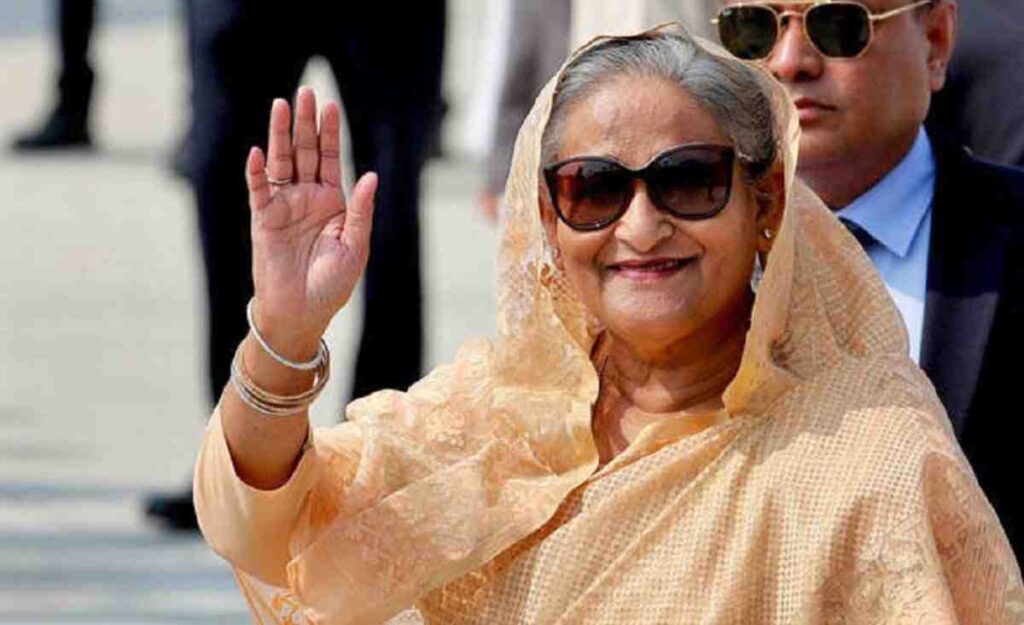Prime Minister of Bangladesh Sheikh Hasina departed Bangabhaban accompanied by her younger sister, Sheikh Rehana, in a military helicopter heading to a “safer place.”

Bangladesh Prime Minister Sheikh Hasina has stepped down and left Dhaka amid escalating violent protests, according to a source cited by news agency AFP. She is reportedly en route to India.
“She and her sister have vacated Ganabhaban (the Prime Minister’s official residence) for a more secure location,” the source informed AFP.
Also Read:- Hamas Leader Ismail Haniyeh Assassinated in Tehran; Group Blames Israel
Hasina departed Bangabhaban at approximately 2:30 PM on Monday, accompanied by her younger sister, Sheikh Rehana, in a military helicopter heading to a “safer place,” as reported by ANI. The aircraft, tracked by Flightradar24, indicated it was above Hazaribagh and anticipated reaching Delhi by 5 PM, following a refusal to land in Kolkata.
The Army Chief confirmed Hasina’s resignation during a press conference, announcing plans for an interim government due to the severe impact of the protests on the economy.
“I take full responsibility,” the general, dressed in military attire, stated, though it was not immediately clear if he would head the caretaker government. “We will establish an interim government,” Waker declared on state television, confirming Hasina’s resignation.
India’s Border Security Force (BSF) has heightened alert along the 4,096 km India-Bangladesh border. Acting BSF Director General Daljit Singh Chawdhary and senior officials are in Kolkata to review security. The unrest, which has resulted in nearly 300 casualties, forced Hasina to resign and seek refuge in India with her sister.
Also Read:- Mexican Drug Lord ‘El Mayo’ Zambada and ‘El Chapo’ Guzman’s Son Arrested in Texas
The Escalation of Protests
The turmoil began last month when at least 150 people were killed and thousands injured in protests led by student groups against reserved quotas in government jobs.
The ‘Students Against Discrimination’ group, which spearheaded the initial job quota protests, is now leading the current demonstrations.
Protests for quota reform paused after the Supreme Court eliminated most quotas on July 21. Protesters returned last week, demanding a public apology from Hasina for the violence, restoration of internet services, reopening of educational institutions, and the release of those arrested.
By the weekend, the demonstrations had evolved into a movement calling for Hasina’s resignation as justice for the victims of last month’s violence was demanded.
The student group initiated a nationwide non-cooperation movement starting Sunday, with the primary demand being Hasina’s resignation.
Also Read:- Nepal Plane Crash Claims 18 Lives Shortly After Takeoff; Pilot Only Survivor
Accusations and Responses
Protesters hold Hasina’s government responsible for the violence in July. Critics and rights groups have accused the government of excessive force, a claim the government denies.
Initially, Hasina, 76, and her administration claimed students were not involved in the quota protest violence, blaming the Islamic party Jamaat-e-Islami and the main opposition Bangladesh Nationalist Party (BNP) instead.
However, following renewed violence on Sunday, Sheikh Hasina stated, “Those committing violence are not students but terrorists intent on destabilizing the nation.”
The student group has rejected Hasina’s offer to discuss the crisis.
Protests began at university campuses in June after the High Court reinstated a quota system for government jobs, overturning a 2018 decision by Hasina’s administration to abolish it.
Also Read:- President Biden Steps Aside, Citing Concerns for U.S. Democracy and Endorsing New Leadership
The Supreme Court later suspended the High Court order following a government appeal, then dismissed the lower court order, directing that 93% of jobs should be based on merit.
Experts also link the unrest to stagnant private sector job growth, making public sector jobs with their steady wages and benefits highly desirable.
The quota system sparked anger among students facing high youth unemployment, with nearly 32 million young people out of work or education in a nation of 170 million.
The struggling economy, once among the world’s fastest-growing due to the booming garments sector, has stagnated. Inflation remains around 10% annually, and dollar reserves are dwindling.
